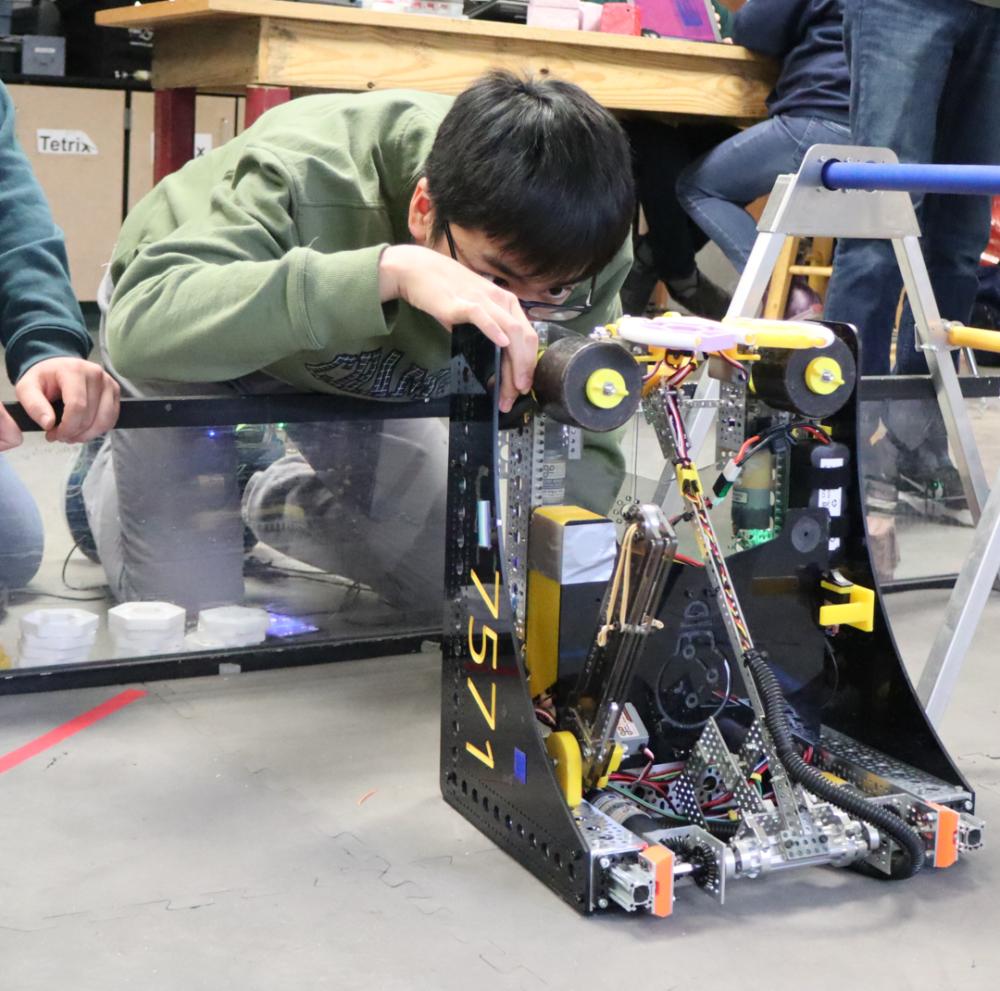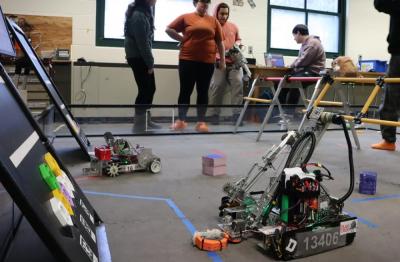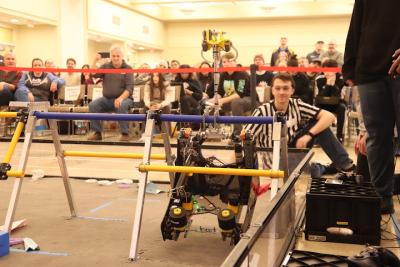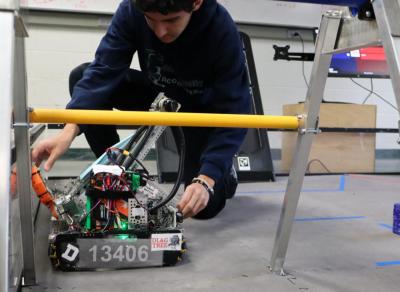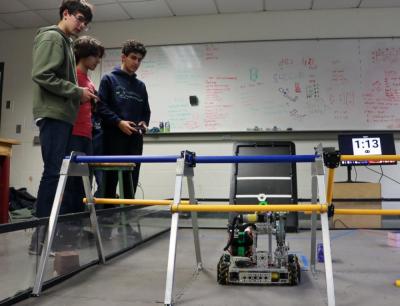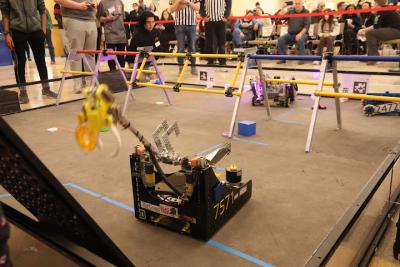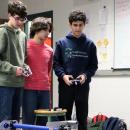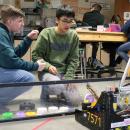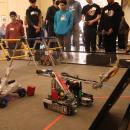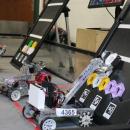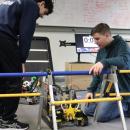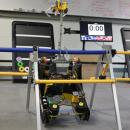Dual victory sends both Dartmouth High robotics teams to state competition
In the robotics competitions that Dartmouth High School competes in, teams are grouped together into “alliances” with other competing teams for each round. By design, the format encourages collaboration — each bot’s team needs to quickly coordinate with their new alliance partner to score as many points as possible.
So what happens when one Dartmouth team allies with another? In the case of the recent Jan. 21 competition at Worcester Polytechnic Institute, they both win big.
Though Dartmouth’s teams, called 13406 and 7571, did not place toward the top of the field initially, they both scored well enough to make it into the semifinal round and prospered together in the “playoffs.”
“Just like, you know, the NFL has 12 teams make the playoffs, 12 of the 32 made the playoffs,” said club advisor and math teacher Gary Lauher. “They won the Super Bowl after.”
Allied with Canton High School as well, the two Dartmouth teams secured back-to-back wins in the final round, finishing in the top slot.
“It felt like I was having a heart attack,” said Savannah Lopes, co-captain of team 13406, about the win.
“It was super thrilling,” said Robotics Club President Kelsey Reilly. “We were wicked low on the scoreboard, and then all of a sudden we shot up to like 11 and then we slowly climbed up.”
Since the two teams were both part of the winning alliance, both teams essentially finished first, together.
“It’s symbolic, in a way,” Lopes said.
“I think a lot of us were jumping up and down, hugging each other, giving each other high fives,” said Steven Wei, co-captain of 7571. “There’s so many different factors that can affect the result and … all of those things meshed together that weekend.”
The smashing success means both Dartmouth teams are off to the races for the 2024 season — they automatically qualify for the state championships in March, and will only need to compete in the Feb. 10 qualifier as a formality. The extended timeline also gives Dartmouth’s teams some extra breathing room to refine their bots and fix some last-minute issues.
The Robotics Club competes in the FIRST Tech Challenge circuit, facing off against hundreds of teams across the state. Each year, FTC designs a new set of challenges, and teams need to design a bot to fit the field.
Each competition contains three parts: an autonomous section, where the bot needs to complete a series of steps without user control, a driver-controlled section, where drivers pilot the bots and complete different point-scoring tasks, and finally the “endgame” section, where bots can complete special tasks for extra points. This year, the game asks bots to toss a paper airplane just outside the ring and pull itself fully off the ground using a bar, essentially doing a robot’s version of a pullup.
Dartmouth’s two teams work independently, which means the bots take unique approaches to the year’s game.
“Every bot you see is radically different,” Lauher said.
Team 7571, which contains more veteran players than 13406, tries to incorporate a new innovation into their bot each year, Steven said, which they then design the bot around. This year, “goRails” were incorporated into the bot, which increase torque and thrust and help the bot accomplish its endgame pull-up despite its heavy weight.
Within each team, club members generally divide and conquer to design each element of the robot, such as the driving mechanics or the claw arm.
For the paper airplane element of this year’s game, 13406 designated a paper airplane “committee” that endeavored to find the ideal flight design.
At about 30 members, the robotics club is at capacity. Lauher said the club’s prosperity can largely be attributed to the amount of youth outreach that’s now done — just five or so years ago, getting even 20 kids into the program was a struggle, he said. Engineering teacher Samuel Brodsky also teaches robotics classes at the high school, which some club members take.
In the offseason, club outreach directors Kayleigh Hull and Chloe Lawrence bring basic robotics lessons to Dartmouth elementary schools and Dartmouth Middle, ranging from a simplified robot cart that kids can pilot, to a playdough and dried spaghetti station for kids to practice building.
“It's really great to see these kids happy and learning something important that hopefully they'll find interesting later in life,” Hull said. “And maybe they'll join our team later on.”
Over the summer, the club hosts week-long summer programs for the same age groups. Club members essentially design their own game and the aspiring young technicians build a bot to fit.
“I can name, I think 6 kids, who joined just this year from our summer programs,” Lawrence said. “I would say our whole team is pretty much funded, people wise, just through our programs.”
With enough people and some extra funding, money wise, the robotics club could and would add a third FTC team, which could serve as a slower, introductory squad for newcomers, much like a junior varsity or freshmen team.
The club’s season continues next weekend, on Feb. 10, when the teams head to the second qualifying match. The state championship will be held at Andover High School on March 9, and Dartmouth’s teams will look to qualify for the FTC World Championship. Dartmouth came close to a spot at Worlds last year, but has still never qualified.



